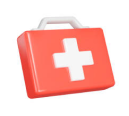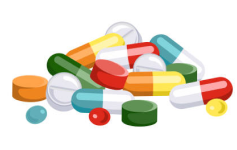Uses
What is NSAIDS for?
NSAIDs are pain medications used to relieve your pain and inflammation (e.g. swelling, redness and warmth).
NSAIDs may be prescribed with disease modifying anti-rheumatic drugs (DMARDs), such as methotrexate, sulfasalazine or biologic agents (e.g. rituximab) for a short period of time.
Examples of NSAIDs include naproxen, diclofenac, mefenamic acid, ibuprofen, celecoxib and etoricoxib.
How should I take or use NSAIDS?
It is usually given orally when necessary. Some NSAIDs are available in suppository formulations although they are hardly used in the treatment of rheumatology conditions
If you are taking NSAIDs for condition called spondyloarthritis (SpA), your rheumatologist will need you to take NSAIDs regularly to control the inflammation.
Doses of NSAIDs vary amongst each other. Your physician will prescribe a suitable dose for you.
Most NSAIDs should be swallowed whole, with a glass of water, after food to prevent stomach upset, usually once or twice a day. The tablets/ capsules should not be crushed or chewed unless otherwise stated.
What should I do if I forget to take or use NSAIDS?
NSAIDs are generally taken on as needed basis and not regularly except when used for spondyloarthritis or as directed by the physician.
If you forget to take a dose, take it as soon as you remember.
If it is almost time for next dose, skip the missed dose and continue with your regular dosing schedule.
Do not double the dose to make up for the missed dose.
Precaution
What precautions should I take when taking or using NSAIDS?
Keep to the dose as prescribed by your rheumatologist. . If there is persistent unbearable pain, make an earlier appointment with your physician.
Come back to the hospital for regular blood test as instructed by your doctor.
Because adverse effects can happen at any time during the course of treatment and some side effects may not cause symptoms, it is important to have your regular blood test done.
Side Effects
What are some common side effects of NSAIDS?
Common side effects
- Dizziness
- Nausea
- Gastric irritation
- Increased blood pressure
Uncommon side effects
- Raised liver enzymes
- Fluid retention
- Compromise kidney function Worsen heart function
- Asthma exacerbation
- Gastric ulcer or bleeding
DO INFORM YOUR PHYSICIAN AND PHARMACIST OF ANY EXISITNG MEDICAL CONDITIONS TO AVOID SERIOUS SIDE EFFECTS OF NSAIDS.
IF ANY OF THE SIDE EFFECTS BECOME SERIOUS, OR IF YOU NOTICE ANY SIDE EFFECTS NOT LISTED IN THIS LEAFLET, PLEASE TELL YOUR DOCTOR OR PHARMACIST
Handling
How should I store NSAIDS?
- Keep away from children
- Keep in a cool, dry place, away from direct sunlight
- Store at room temperature
For more information
What else should I know about NSAIDS?
How LONG does it take for the medicine to be EFFECTIVE?
- It usually takes 30 minutes to 1 hour for NSAIDs for pain relief. A longer time to effect is required for anti-inflammatory effect. The usual duration is 1 week.
When do I seek medical attention IMMEDIATELY?
Come back to the hospital if you have:
- Signs of an allergic reaction such as rash; hives; itching; red, swollen, blistered, or peeling skin with or without fever; wheezing; tightness in the chest or throat; trouble breathing or talking; unusual hoarseness; or swelling of the mouth, face, lips, tongue, or throat.
- Bad skin irritation
- Jaundice (eyes or skin turn yellow)
- Breathlessness
- Gastric irritation with dark stools
Can I take other MEDICINES or SUPPLEMENTS?
- Always inform your physician and pharmacist of all the medications that you are taking as there are certain medications not suitable to be taken with NSAIDs.
- NSAIDs generally cause blood to be thin. If you are taking any long term blood thinners such as aspirin, clopidogrel or warfarin, do inform your physician and pharmacist. Taking NSAIDs with a blood thinner may increase the risk of bleeding especially in the stomach.
- Always check with the doctor or pharmacist first before self-treatment with any over-the-counter medicines.
- DO NOT take any supplements, alternative or herbal medicines without informing your doctor or pharmacist. Some herbal or alternative medicines have blood thinning effect and can increase the risk of bleeding
What special DIETARY instructions should I follow?
- Maintain adequate hydration (2-3 liters of fluid a day, unless otherwise advised by your doctor) and nutrition (small, frequent meals are preferred).
- Alcohol should be avoided if possible or kept to a minimum as suggested by your rheumatologist because alcohol may increase the risk of liver toxicity associated with NSAIDs.
Can I get PREGNANT or BREASTFEED?
- NSAIDs may affect female fertility with chronic use.
- NSAIDs may also potentially cause harm to the fetus. Do inform your doctor if you are pregnant, planning for pregnancy and require to have ongoing therapy with NSAIDs.
- NSAIDs are generally found to be safe for use in patients who are breast-feeding, however, you are still highly encouraged to inform your physician and pharmacist if you intend to breastfeed and is on concurrent NSAIDs therapy.
In SUMMARY... what you need to know about NSAID?
- Beware of the SIDE EFFECTS and when to get immediate medical attention.
- Never take medicines, supplements or herbal treatments OVER-THE-COUNTER without checking with your physician or pharmacist first.
- If you (female) intent to start a family, please inform your doctor as NSAIDs may affect your fetus and fertility.
- If you have further questions about NSAIDs, please call ______________________ (office number) to discuss with your doctor / pharmacist / specialty nurse (please circle as appropriate).
Read on for more information on the use of nSAIDs as postnatal medication.
Disclaimers
If you take more than the recommended dose, please seek medical advice immediately. The information provided on this page does not replace information from your healthcare professional. Please consult your healthcare professional for more information.
This article is jointly developed by members of the National Medication Information workgroup. The workgroup consists of cluster partners (National Healthcare Group, National University Health System, and SingHealth), community pharmacies (Guardian, Unity, and Watsons), and the Pharmaceutical Society of Singapore. The content does not reflect drug availability and supply information in pharmacies and healthcare institutions. You are advised to check with the respective institutions for such information.
Contributed by
Last Updated on June 2015

Need More Medicine?
Use Medicine Order Service on HealthBuddy.

Medicines Reminder
Get reminders and chart progress on HealthBuddy.

















